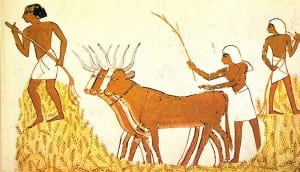Agriculture Through the Millennia
The previous post talked about the possible causes for the origin of agriculture. It must be noted that this was not an all or nothing switch from the hunter-gatherer lifestyle to agriculture but instead the transition to and development of agriculture took a slow few thousands of years. Two dominant themes that are thought to be the drivers behind the increasing influence of agriculture are 1) the ability to control food supply and 2) increasing population pressure.
(I will not delve too much into the details/
controversies in theories of the pre-modern period of agricultural evolution
because I feel that I do not have the relevant experience in anthropological
studies and that it is not really the focus of the blog but is here to provide
a more wholesome picture and to point out some relevant and more certain
points)
Through
the ~10,000 years,
archaeological evidence demonstrated that humans selected crops suitable or
better adapted to growth in their areas such as rice in Asia, wheat, barley and
lentils in the fertile crescent. During the Bronze Age,
the Sumerians were said to be the pioneers of intensive agriculture i.e.
large-scale mono-cropping systems. This was helped by 1) the fertility of the
fertile crescent and 2) the invention of technological know-how that allowed the harnessing of animal power such
as plowing by oxen and practices of irrigation. This gave them more control
over the variables that affected the crops they grew. It was also during that time that the
earliest sheep and goats were domesticated. Later on at around ~3000BC, the common crops of potato, tomato,
beans and pepper were cultivated in the New World (Americas). This
proliferation of agriculture was said to have occurred through what R.
Braidwood calls 'cultural diffusion' between 'nuclear zones'. Consequently, it was this development of
agriculture that formed an important part of the foundations of transformation to
civilizations i.e. cities.
Through the
middle-ages and renaissance, agricultural expansion was facilitated by further
improvements of irrigation technologies and build-up of farming techniques
through greater scientific discovery e.g. invention of crop rotation and
sharing of technological know-how such as the mouldboard plough (invented by
the Chinese) which greatly improved efficiency. These technological improvements when coupled to
repeated selection of hardy and productive crop strains allowed higher and
higher productivity.
Still, these
developments in agriculture, though they occurred over a span of thousands of
years, cannot compare to the massive change which occurred during the period of
industrial agriculture which came about
with the industrial revolution. And this is where we get to the grit of the
matter, where agriculture crosses paths with global environmental change. First
in the sense of cumulative change (e.g.
landuse changes in local areas summed up to affect large proportion of the
world) and later systemic change (e.g. emissions of greenhouse gases from crop
cultivation or livestock rearing). In
subsequent posts, I will attempt to address the significant events in modern
agriculture and their environmental impact (both good and bad) through recent
decades. These areas include (not exhaustively):
Issues/ Problems:
- Agricultural Landuse
- Use of Mechanical help & Long-distance Transport
- Came about due to the availability of fossil fuels for energy
- Use of Fertilisers
- Came about with the knowledge of what nutrients plants need & processes to artificially synthesize them
- Use of Pesticides
- Came about due to the manufacture of chemicals in WWII
- Concentrated Animal Feeding Operation
- Came about with the knowledge of vitamins, growth hormones and antibiotics
- The Green Revolution
Proposed solutions:
- Organic farming
- Sustainable Agriculture
etc.
So, what can we draw from all of the history of
agriculture?
Once again, we can
see that the development of agriculture through the years drew upon the expertise of
technological and scientific knowledge (allowing the 'exploitation' of the
natural environment). The question I would like to ask is: how beneficial has
this development been? Has sound scientific knowledge really informed this
development? These, of course, are highly contentious questions.
For one, it has
indeed supported the prolific growth of the human population which otherwise
would have been quite impossible (food production doubled four times between
1820 and 1975) while reducing the manpower and freeing up our time for
countless other activities. Still, the environmental impacts of these decisions
have never been more telling and lucid than they are today. Many nay-sayers,
witnessing the onslaught of the degradation of both environment and human
health brought about by many modern practices have hailed for a return to a
back-to-the-past farming model. However, I would like to put forth that in this
evolution of agriculture, while it might have veered off the course more than
we would have liked, can't be all bad.
Surely some techniques were grounded in sound ecological principles and should
continue to be upheld into the future. I am looking forward to teasing out, as
much as I can, what exactly these might be and searching out alternatives where
we have failed so far.
References:
1. John Abraham. 1991. Food and
Development: The Political Economy of Hunger and the Modern Diet. WWF
& Kogan Page Ltd.
2. History of Agriculture. http://www.newworldencyclopedia.org/entry/History_of_agriculture#Sumerian_agriculture
3. History of Agriculture. http://en.wikipedia.org/wiki/History_of_agriculture
4. Robert J. Braidwood. 1979.
"The Agricultural Revolution". Hunter, Farmers and
Civilization: Old World Archaeology. http://pleasanton.k12.ca.us/avhsweb/murphyc/web/apworld/summer/farm.pdf





No comments:
Post a Comment